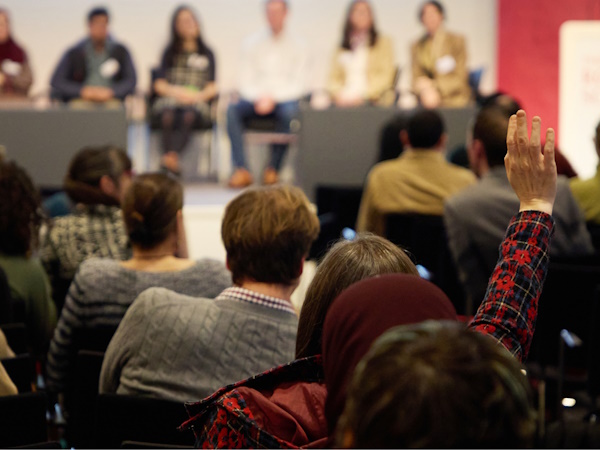From being to identity: analysis and synthesis of the self
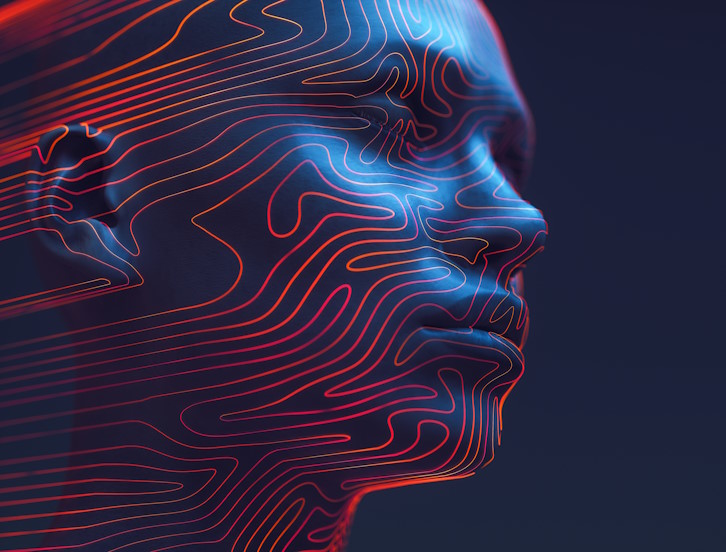
Discussion meeting organised by Professor Tony Prescott, Professor Agnieszka Wykowska, Professor Sarah Garfinkel, and Professor Paul Verschure.
What is the self and how is it constituted? How can we understand the diversity of human selves? Will technology change our sense of self? We will explore these critical questions through contemporary analytic approaches, in psychology, neuroscience and philosophy to understanding human selves, and synthetic approaches that investigate the construction of sense of self in artefacts such as robots.
View the conference recording
Watch the full video playlist on the Royal Society YouTube channel.
Organisers
Schedule
Chair
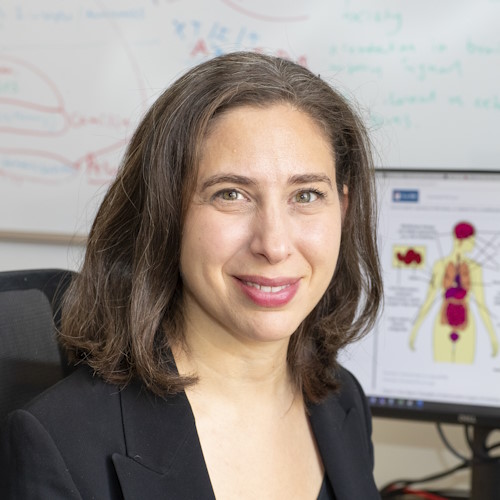
Professor Sarah Garfinkel
University College London, UK

Professor Sarah Garfinkel
University College London, UK
Sarah Garfinkel is a Professor of Cognitive Neuroscience and Group Leader of the Clinical and Affective Neuroscience Group at the Institute of Cognitive Neuroscience, University College London (UCL). She completed her PhD in Experimental Psychology at the University of Sussex, before undergoing a fellowship in Psychiatry and Neuroscience at the University of Michigan with further training in Autonomic Neuroscience at the Brighton and Sussex Medical School. Her current work at UCL focuses on brain-body interactions underlying emotion and cognition, with a particular focus on the heart. Adopting a translational perspective, she investigates the relationship between cardiac mechanisms and emotion in different clinical conditions. In September 2018, Sarah was named by the journal Nature as one of 11 "Rising Star" researchers, across all STEM disciplines internationally. In 2021 Sarah was awarded the mid-career prize by the British Cognitive Neuroscience Society.
| 09:00-09:05 |
Welcome by the Royal Society and lead organiser
|
|---|---|
| 09:05-09:30 |
A systems view of the human self
The experience of being, or having, a self—contained by our bodies and able to act in the world—comes naturally to us as humans, along with a feeling of being the same self from day-to-day and of seeing others as also being selves. For William James, there were two sides to the self—the subject “I”, and the object “me”. While philosophy and consciousness science have largely focused on the problem of subjectivity; psychology, and latterly, cognitive neuroscience have developed a science of understanding self as object. An important theme in our emerging understanding of self is its decomposition into sub-systems. The sense of self, minimally, can be decomposed into systems related to senses of body ownership and of agency; both arising from a primary distinction between self and other. In neurotypical adults, the self is extended by an awareness of self as persisting in time, of social others as also being selves, and by a self-concept shaped by socialisation and autobiographical memory. Results from the analytical sciences—particularly developmental psychology, cognitive neuroscience and neurology—support the notion that these different aspects of self derive from partially dissociable sub-systems. These sub-systems interact to form the wider sense of self, have a developmental timeline, and their differential expression gives rise to a diversity of human experience of selfhood. Recent synthetic approaches, including the construction of physical models (robots), are making it possible to build and test theories of the embodied self, and of its development, in behaving systems. This talk will provide an overview of this “systems” view of self by way of introduction to this Discussion Meeting. Professor Prescott will also argue that this emerging view suggests a possible path to re-unifying “I” and “me” by seeing both as the consequence of an embodied complex dynamical system actively inferring its own existence as the best explanation for its experience. 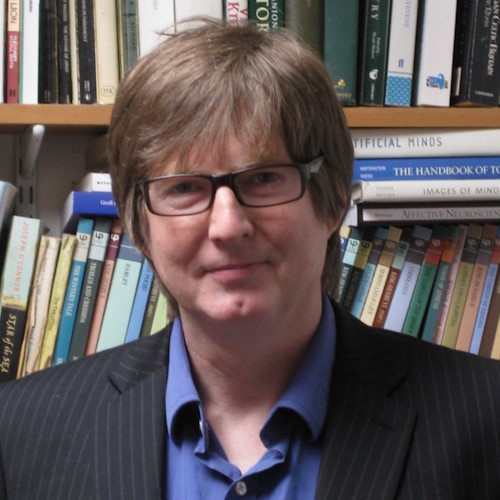
Professor Tony PrescottUniversity of Sheffield, UK 
Professor Tony PrescottUniversity of Sheffield, UK Tony Prescott is Professor of Cognitive Robotics at the University of Sheffield in the UK. His background mixes psychology, neuropathology and brain theory with robotics and AI, and his research aims at answering questions about natural intelligence by creating synthetic entities with capacities such as perception, memory, emotion and sense of self. He has worked extensively on brain-inspired cognitive architectures for both mammal-like and humanoid robots, and with his own collaborators has created several novel animal-like robot platforms. Tony has co-authored over 250 journal articles and conference papers and the edited volumes Scholarpedia of Touch and the Handbook of Living Machines. His popular science book The Psychology of Artificial Intelligence, published in 2024, explores the similarities and differences between human and artificial intelligence. |
| 09:30-09:40 |
Discussion
|
| 09:40-10:10 |
Subjectivity and selfhood: is there a difference?
It should by now be fairly well established that it makes little sense to ask questions such as "what are the underlying mechanisms of selfhood", "when in development does selfhood emerge" or "can the intake of psychedelics lead to self-loss" if one does not specify what aspect, or dimension or sense of self one is targeting. Already in 1988, Neisser distinguished five senses of self (the ecological, interpersonal, extended, private, and conceptual) and went on to argue that they differ in their developmental histories and in the pathologies to which they are subject. Given this variety, one obvious question to ask is how minimal one can go. What is the least you can make do with and still call a self? The discussion of that particular question is ongoing. In my talk, I will engage with quite recent debates in philosophy of mind, Buddhist studies, and the study of psychedelics, and address the question of whether the subjectivity of experience amounts to a minimal and foundational form of selfhood. 
Professor Dan ZahaviUniversity of Copenhagen, Denmark 
Professor Dan ZahaviUniversity of Copenhagen, Denmark Dan Zahavi is Professor of Philosophy and director of the Centre for Subjectivity Research at the University of Copenhagen. Zahavi’s primary research area is phenomenology and philosophy of mind, and their intersection with empirical disciplines such as psychiatry, psychology, and anthropology. In addition to various scholarly works on the phenomenology of Husserl, Zahavi has mainly written on the nature of selfhood, self-consciousness, intersubjectivity, empathy, and most recently on topics in social ontology. His most important publications include Self-awareness and Alterity (1999/2020), Husserl’s Phenomenology (2003), Subjectivity and Selfhood (2005), The Phenomenological Mind (together with Shaun Gallagher) (2008/2012/2021), Self and Other (2014), Husserl’s Legacy (2017), Phenomenology: The Basics (2019/2025), and Being We (2025). His work has been translated into more than 30 languages. |
| 10:10-10:20 |
Discussion
|
| 10:20-10:30 |
Poster spotlights
|
| 10:30-11:00 |
Break
|
| 11:00-11:30 |
Do it for the plot: narrative self and identity
The idea that self and identity should be understood in narrative terms is widespread in everyday thought and has been developed theoretically in philosophy and psychology, among other academic disciplines. This idea has also been vehemently criticised on both epistemic and ethical grounds. Epistemic critics argue that a narrative conception of self-identity is necessarily inaccurate. The stories we tell of our lives are subject to all kinds of distorting biases and pressures, they argue. They insist also that such a view requires us to treat a human life, which is a messy, natural process, as if it has the coherent, unified form of an aesthetic artifact, something that is obviously false. Some ethical critics worry that our narratives are often self-serving. Others emphasise that social master narratives can be oppressive. Yet others worry that trying to conform one’s life and identity to a narrative structure stifles creativity and self-expression. The overall force of these criticisms is difficult to assess. This is largely because there is a wide range of narrative views of self and much unclarity about just what a narrative is and how it constitutes a self. This talk employs insights from cognitive neuroscience, developmental psychology, literary theory, and philosophy to articulate and defend a concrete account of the narrative self that recognises and addresses what is legitimate in the traditional objections while retaining the unique explanatory force gained by employing a narrative approach. 
Professor Marya SchechtmanUniversity of Illinois Chicago, USA 
Professor Marya SchechtmanUniversity of Illinois Chicago, USA Marya Schechtman is LAS Distinguished Professor of Philosophy and a member of the Laboratory of Integrative Neuroscience at the University of Illinois, Chicago. She received her PhD in philosophy from Harvard University in 1988. Her research focus is personal identity and the self, with special emphasis on the intersection of metaphysical, empirical, and ethical questions. She is the author of The Constitution of Selves (Cornell University Press 1996), Staying Alive: Personal Identity, Practical Concerns and the Unity of a Life (Oxford University Press 2014), and The Self: A Very Short Introduction (Oxford University Press 2024), as well as numerous articles and chapters on self, identity, memory, and mind. She is past President of the Central Division of the American Philosophical Association (2023-2024). |
| 11:30-11:40 |
Discussion
|
| 11:40-12:10 |
The distributed adaptive control of self and volition: the case for the plausibility of biological free will in the physical universe and its synthesis in living machines
The Distributed Adaptive Control (DAC) theory of mind and brain posits that the brain can be conceived as a multi-layered control system across which distinct processing cascades transform and integrate states of the World, Self, and Action. From the perspective of multi-layered control, the Self can be understood as comprising four components: reactive, adaptive, contextual, and virtualisation. These four layers of self are constructed from evolutionary ancient allostatic self-preservation mechanisms, which respond to challenges posed by the physically instantiated self and its environment, to the adaptive representation of the niche, the needs of the self, and the action repertoire, to the goal-oriented policy construction by the contextual self, and the meta-representational and auto-noetic declarative understanding of the virtualised self. Moving across these levels of control, the representation and control of perception, self, and action triades become increasingly dependent on memory systems and the intrinsic dynamics of the brain. As an example, we can consider the immediate responses to the triggering stimuli linked to stereotyped behaviours to the exploration of potential future action policies through mental time travel. This indicates that behavioural control balances the trade-off between robust, inflexible, fast responses and brittle, flexible, and slow choices. In this progression from reacting in a predetermined way to flexible and deliberate choice in unknown environments and tasks, the brain is extracting itself from the coercion of real-world forces and displaying a capability of freedom of choice or free will, allowing the Self to autonomously not only control its interactions with the environment but in turn shape this environment as a form of niche construction. This contribution will develop the notion that a multi-level understanding of Self by necessity links it to Free Will. I will contrast this view to the alternative deterministic perspective and argue that compatibility between a biologically grounded notion of embodied free will and a pseudo-deterministic universe can be found when considering the critical dynamics of the brain, its explicit meta-control through various neuronal pathways, combined with the brain’s mechanisms of counter-factual learning and epistemic autonomy. 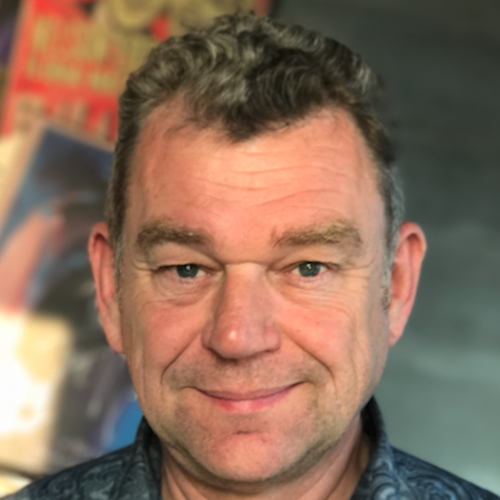
Professor Paul VerschureUniversidad Miguel Hernandez de Elche, Spain 
Professor Paul VerschureUniversidad Miguel Hernandez de Elche, Spain Dr Paul FMJ Verschure is the Unversidad Miguel de Elche Distinguished Professor affiliated with the CSIC Alicante Institute of Neuroscience and Department of Health Psychology. Paul has received his MA and PhD in Psychology and pursued his research at different leading international institutes, including the Neurosciences Institute and the Salk Institute, both in San Diego, the University of Amsterdam, University of Zurich, the Swiss Federal Institute of Technology-ETH, University Pompeu Fabra in Barcelona and Radboud Universiteit. Paul has developed a unified theory of mind and brain, Distributed Adaptive Control (DAC), where he validates using empirical and synthetic methods. His research spans neuroscience, neurotechnology, cognitive science, robotics, artificial intelligence, and virtual/augmented-mixed reality. DAC has been applied to various technology that support and advance the human condition in the areas of Digital Brain Health, Education, and Cultural Heritage. Paul has coordinated and participated in many European projects, including as coordinator of the European University Alliance of Brain and Technology NeurotechEU. Paul founded the SPECS research group in 1996, which comprised a multidisciplinary team of doctoral and post-doctoral researchers, including psychologists, engineers, and biologists who have widely published their results in leading journals and conferences. Paul co-chairs the annual Living Machines conference, the Alicante/Barcelona Cognition, Brain and Technology summer school, and he hosts the Convergent Science Network podcast with over 120 episodes. Paul has started several spin-off companies, Eodyne Systems and Sapiens5, and chairs the Future Memory Foundation and the Convergent Science Network. Paul is a dedicated endurance athlete and has completed 25 Ironman races. |
| 12:10-12:20 |
Discussion
|
| 12:20-12:30 |
Poster spotlights
|
Chair

Professor Tony Prescott
University of Sheffield, UK

Professor Tony Prescott
University of Sheffield, UK
Tony Prescott is Professor of Cognitive Robotics at the University of Sheffield in the UK. His background mixes psychology, neuropathology and brain theory with robotics and AI, and his research aims at answering questions about natural intelligence by creating synthetic entities with capacities such as perception, memory, emotion and sense of self. He has worked extensively on brain-inspired cognitive architectures for both mammal-like and humanoid robots, and with his own collaborators has created several novel animal-like robot platforms. Tony has co-authored over 250 journal articles and conference papers and the edited volumes Scholarpedia of Touch and the Handbook of Living Machines. His popular science book The Psychology of Artificial Intelligence, published in 2024, explores the similarities and differences between human and artificial intelligence.
| 13:30-14:00 |
How does the developing brain construct a self?
Our capacity for self-awareness is often considered a defining feature of human consciousness and in adulthood allows us to imagine how others see us, recollect our past, and contemplate our future. Our work has shown that in infancy, the emergence of self-representation in the second year of life profoundly changes developing cognition. Yet, there are currently no mechanistic accounts of how it could develop, and empirical investigation within contemporary developmental science is surprisingly absent. In this talk, Professor Southgate will propose a new account of the development of self-representation. Drawing on a wealth of data from cognitive neuroscience and developmental psychology, this account articulates a mechanistic pathway through which self-awareness emerges as a consequence of being the recipient of caregiver ostensive cues. First, signals like direct gaze modulate the infant’s heartrate, bringing it to awareness and resulting in a feeling state functionally specified as belonging to the body. Second, infants have an expectation that communicative cues are referential. Professor Southgate proposes that this expectation leads infants to generate a placeholder referent when they are the recipient of others’ ostension, because in the absence of a representation of self, they are initially unable to identify themselves as the referent. However, with time they will fill this placeholder with the feeling state accompanying the modulation of heartrate, and it is in this process that an initial concept of self emerges. This account accommodates cross-cultural data indicating wide variation in the development of self-awareness in early development, as well as apparent species differences in the capacity for self-representation. 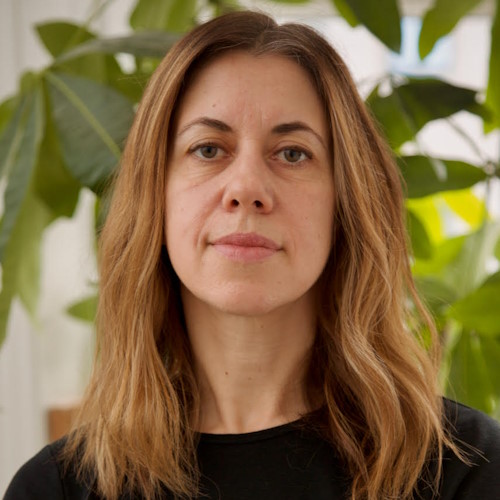
Professor Victoria SouthgateUniversity of Copenhagen, Denmark 
Professor Victoria SouthgateUniversity of Copenhagen, Denmark Victoria Southgate is a Professor of Developmental Cognitive Neuroscience at the University of Copenhagen with a research focus on social cognitive development in infancy. Her research explores how infants develop an understanding of self and other, and the developmental interplay between them. She received her PhD from the University of St Andrews and was a postdoc and then a Wellcome Trust Career Development Fellow at the Centre for Brain and Cognitive Development at Birkeck, University of London. She established the Centre for Early Childhood Cognition at the University of Copenhagen in 2018 with an ERC Consolidator Grant and currently leads multiple grants exploring the emergence of a self-awareness in early development. |
|---|---|
| 14:00-14:10 |
Discussion
|
| 14:10-14:40 |
The embodied self
Studying the prerequisites for an artificial self can provide insights into the processes of self-construction in humans, as well as into principles of learning and development in robotics, and can enable more intuitive human-robot interaction. In this talk, Professor Hafner will discuss the prerequisites for developing a minimal self in artificial embodied systems, introduce measures of the self, and present computational models that enable decision making and tool-use. 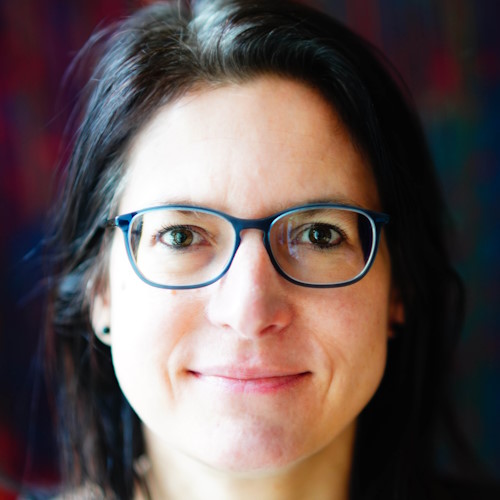
Professor Verena HafnerHumboldt-Universität zu Berlin, Germany 
Professor Verena HafnerHumboldt-Universität zu Berlin, Germany Verena Hafner is Professor of Adaptive Systems in the Department of Computer Science at Humboldt-Universität, Berlin. She holds a Master’s degree with distinction in Computer Science and AI from the University of Sussex, and a PhD from the Artificial Intelligence Lab at the University of Zurich. She has also worked as an associate researcher in the Developmental Robotics Group at Sony Computer Science Labs in Paris. She is a member of the Programme Committee of the DFG Priority Programme "The Active Self" and a PI in both the DFG Cluster of Excellence "Science of Intelligence” and the EU Horizon EIC project METATOOL. Her research on open-ended development and social interaction in artificial agents has attracted significant interest in the cognitive and developmental robotics community. She also has substantial experience in interdisciplinary collaboration. Her research interests include sensorimotor interaction and learning, joint attention, and the artificial self. |
| 14:40-14:50 |
Discussion
|
| 14:50-15:00 |
Poster spotlights
|
| 15:00-15:30 |
Break
|
| 15:30-16:00 |
The body, felt and perceived, as first prior
How do we come to be the way we are? Tracing the origins of selfhood takes us back to the experience of one’s body as a first prior. Starting from the privileged status that homeostatic priors have within the cortical hierarchy of an organism whose main imperative is to maintain homeostasis, one can consider the mechanisms that underlie interoceptive precision and its impact on embodiment and cognition. But the self’s body is not only felt from within, it is also perceived and understood from the outside. The psychological roles that interoception and exteroception play for the scaffolding, maintenance or updating of self-awareness throughout life need to be understood not in their antagonism but in their integration. 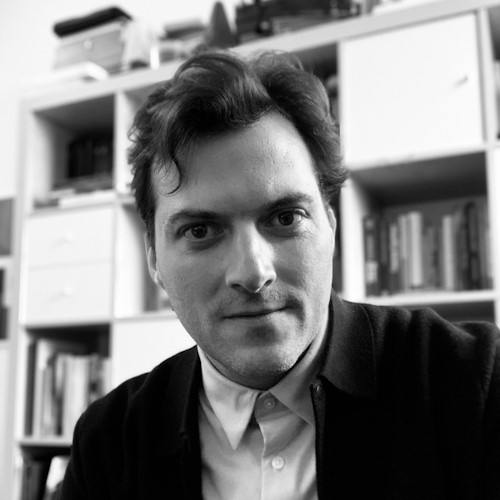
Professor Manos TsakirisRoyal Holloway, University of London, UK 
Professor Manos TsakirisRoyal Holloway, University of London, UK Manos Tsakiris is Professor of Psychology at the Department of Psychology, Royal Holloway, University of London, where he leads the Lab of Action & Body (LAB). His research is highly interdisciplinary and focuses on how bodily and feeling states influence our self-awareness and socio-political behaviour. He is the recipient of the Young Mind and Brain Prize, of the 22nd Experimental Psychology Society Prize, and the NOMIS Foundation Distinguished Scientist Award. Since 2021, he has been the director of the interdisciplinary Centre for the Politics of Feelings at the University of London. |
| 16:00-16:10 |
Discussion
|
| 16:10-16:40 |
I, Robot
Under the unrealistic and ethically doubtful endeavour of building conscious machines, we decided to build a sympathetic minimal self on a robot following neuroinspired principles. Our starting point was understanding how the brain perceives and controls the body, and our endpoint will be achieving physical intelligence. Grounded on well-known theories, such as the Ideomotor, the Comparatory model, and the Free Energy Principle, I summarise a set of experiments and theoretical accounts that drive us from learning the sensorimotor mapping behind body ownership to controlling and anticipating and the consequences of the robot actions, developing some kind of agentive behaviour. In particular, I describe the generalisation of von Helmholtz's perceptual unconscious inferences to action, showing that we exert compensatory movements to reduce our world model uncertainty, complementing the classical intentional goal-directed movements. Its corollary is my proposal of an Embodied Turing Test where the active self participates as a key ingredient in problem-solving. This experiment forces the "facio, ergo sum, ergo cogito", as the robot needs to disambiguate itself before making any decision. Fortunately, we failed, the robot is still not conscious. But, can robots think about thinking? 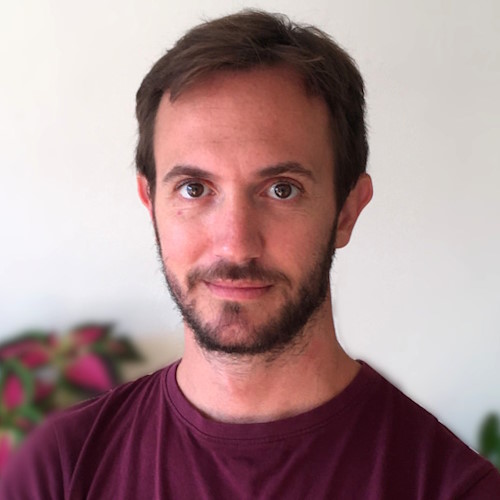
Dr Pablo LanillosSpanish National Research Council, Spain 
Dr Pablo LanillosSpanish National Research Council, Spain Pablo Lanillos leads the Neuro Ai and Robotics group (NAIR) at the Cajal Neuroscience Centre, Spanish National Research Council (CSIC), and guest researcher at the Donders Institute for Cognition. His research leitmotif is to transform our understanding of human embodied cognition into future technologies. His team develops neuroscience-inspired AI algorithms for achieving human-like perception and action in robots, and form providing better models of body perception. His lab is well know for active inference in robotics. He completed his doctoral studies in Computer Engineering at the Complutense University of Madrid, got the Marie-Sklodowska Curie award at the Technical University of Munich, gained tenure as as Assistant Professor at Radboud University Nijmegen and obtained a (civil servant) permanent position at the CSIC in 2025. |
| 16:40-16:50 |
Discussion
|
| 16:50-17:00 |
The plasticity of the bodily self and interpersonal interactions: investigating the neurophysiological interplay between interpersonal motor interactions and one’s own body schema
When moving in a constantly changing world, we are continuously bombarded by sensory information, both from the external environment and from our own body. In this framework, understanding if and how the perceptual processes underlying the experience of one’s own self plastically adapt to environmental changes occurring during interpersonal motor interactions remains a crucial question. We examined whether one’s own body schema is affected by the re-weighting of sensory channels used in previous interpersonal interactions by measuring explicit, implicit, and neurophysiological measures of individuals’ malleability to the rubber-hand illusion (ie RHI). Our preliminary data show that the strength of the illusion significantly decreases following an interpersonal interaction where the tactile channel was not used, and that the neural patterns related to the illusion are differently modulated following each interpersonal interaction. These findings suggest new avenues for sensorimotor approaches in social neuroscience, emphasising the malleability of self-other effects based on the nature of interpersonal interactions. 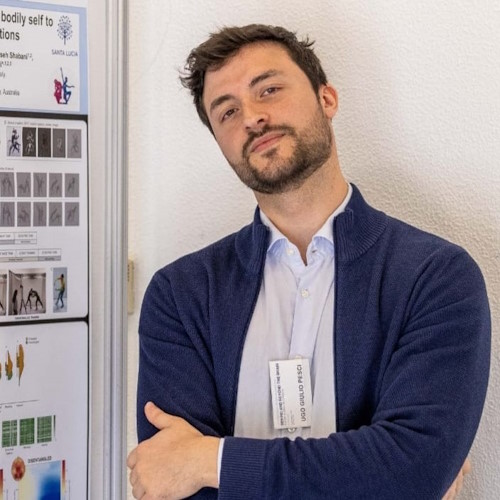
Ugo Giulio PesciSapienza University, Italy 
Ugo Giulio PesciSapienza University, Italy Ugo Giulio Pesci is a postdoctoral researcher at the Department of Psychology, Sapienza University and IRCCS Santa Lucia Foundation in Rome (IT). Since his PhD, Pesci has been working on action monitoring and multisensory perception, from exploring how they might be modulated by social motor interactions to understanding how we can improve our way to investigate them at the neurophysiological level. To do so, he uses a combination of univariate and multivariate approaches to analyse behavioural and electrophysiological data. Generally, he is interested in time-series data, sociality and how we can move from the understanding of fundamental mechanisms to ecological (ie developmental, clinical) applications. |
Chair
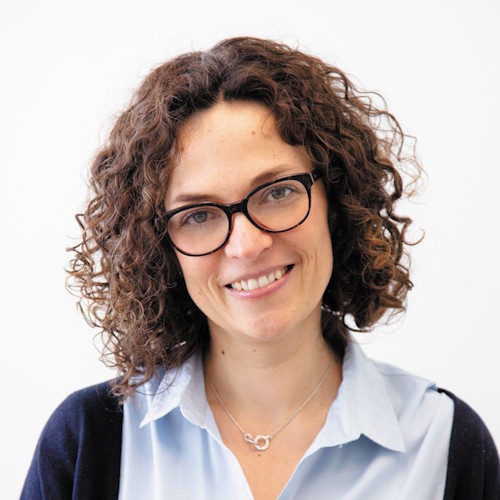
Professor Agnieszka Wykowska
Italian Institute of Technology, Italy

Professor Agnieszka Wykowska
Italian Institute of Technology, Italy
Professor Agnieszka Wykowska is the head of the unit "Social Cognition in Human-Robot Interaction" at the Italian Institute of Technology (IIT), in Genoa, Italy. She is also the Coordinator of the Centre for Human Technologies (IIT). She has a Master's Degree in Neuro-Cognitive Psychology (2006) and a PhD in Psychology (2008) from the Ludwig Maximillian University Munich. In 2016 she was awarded the ERC Starting grant "InStance: Intentional Stance for Social Attunement". She is Editor-in-Chief of International Journal of Social Robotics. Between 2022 and 2024 she served in the role of President of the European Society for Cognitive and Affective Neuroscience (ESCAN). In 2023 she was awarded the Hans-Fischer Senior Fellowship from the TUM Institute of Advanced Studies to lead a research group "Human Cognition in Neuroengineering". She combines cognitive neuroscience methods with human-robot interaction to understand the human brain mechanisms in interaction with other humans and technology.
| 09:00-09:30 |
Interoception and emotion in sense of self
Interoception is the process by which the nervous system senses, integrates and interprets internal bodily sensations, such as signals arising from the heart. Affective and emotional feeling states are influenced by different levels of interoceptive processing. These levels encompass afferent, neural, behavioural accuracy and higher-order measures related to interoceptive judgments ascertained via subjective report and the attribution of bodily signals. This talk will detail how these different interoceptive dimensions, at different levels of processing, can guide and shape cognition and emotion processing. The nature of afferent signals, their representation in brain, their precision and higher order representation are selectively altered in different clinical conditions, with implications for symptom expression. 
Professor Sarah GarfinkelUniversity College London, UK 
Professor Sarah GarfinkelUniversity College London, UK Sarah Garfinkel is a Professor of Cognitive Neuroscience and Group Leader of the Clinical and Affective Neuroscience Group at the Institute of Cognitive Neuroscience, University College London (UCL). She completed her PhD in Experimental Psychology at the University of Sussex, before undergoing a fellowship in Psychiatry and Neuroscience at the University of Michigan with further training in Autonomic Neuroscience at the Brighton and Sussex Medical School. Her current work at UCL focuses on brain-body interactions underlying emotion and cognition, with a particular focus on the heart. Adopting a translational perspective, she investigates the relationship between cardiac mechanisms and emotion in different clinical conditions. In September 2018, Sarah was named by the journal Nature as one of 11 "Rising Star" researchers, across all STEM disciplines internationally. In 2021 Sarah was awarded the mid-career prize by the British Cognitive Neuroscience Society. |
|---|---|
| 09:30-09:40 |
Discussion
|
| 09:40-10:10 |
Body and self: hostile interactions
This talk presents a snippet from the planned article (with Olaf Blanke) for the PTRS-B on Phantomology. Phantomology, a term borrowed from Stanisław Lem, is the study of the virtual reality of the "body-in-the-brain", that is, the phenomenal awareness of having a bodily existence. Across all levels of phantomisation—phantom limbs, phantom hemibodies, and phantoms of the self (doppelgänger)—clinical cases reveal striking instances of aggression toward the body or some of its parts. Professor Brugger will touch on anarchic limbs, the hatred of hemiplegic twins, and hostile doppelgänger. Additionally, he will discuss Body Integrity Dysphoria (BID), better known as the desire for healthy limb amputation. Professor Brugger will share his ambivalence regarding its classification as a mental disorder in ICD-11. Is it pathological to desire the amputation of a major limb? Where is the boundary between erotic and hostile body modification? Phantomology seeks to provide a unified framework for understanding the relationship between body and self—one that includes psychological dimensions, regardless of whether such experiences are deemed healthy, pathological, or otherwise deviant by a given society. 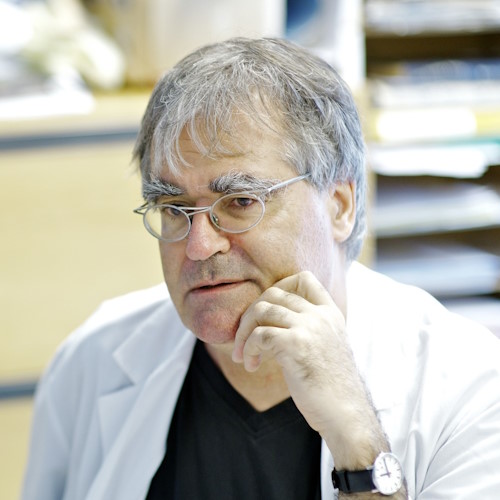
Professor Peter BruggerUniversity of Zurich, Switzerland 
Professor Peter BruggerUniversity of Zurich, Switzerland Professor Brugger was born in 1957 and grew up in Zurich, Switzerland. After work as an Elementary School teacher, he studied biology at the University of Zurich (promotion in zoology) and received postdoctoral trainings at UC San Diego and University of Victoria (Canada). Back in Switzerland (with wife Susan, two boys and an American girl), he worked as a clinical neuropsychologist at the University Hospital Zurich (head of Unit since 2003). His main research interests are: randomness and behaviour, neuropsychology of belief and para-normal ideation, creativity and madness, representation of body, space and time. In his last few years before retirement (in 2023), he conducted clinical work at a Rehabilitation Centre in the Swiss mountains (Valens). |
| 10:10-10:20 |
Discussion
|
| 10:20-10:30 |
Beyond the here and now: mentalising, retrospection, and prospection
Background: The ability to integrate different types of self-related information is fundamental to forming a self-concept that organises past experiences and future possibilities into a cohesive representation of the self that spans time. Mentalising—the ability to understand and represent alternative mental states—might play a significant role in self-referential cognition by providing a mechanism for representing alternative versions of the self in the past and the future. However, few studies have directly explored these cognitive mechanisms in autistic people, and the relationship between these abilities remains unclear. Aims: This study examines how autistic and non-autistic people distinguish between their self-representations in physical and psychological domains over time through carefully controlled tasks that vary only in the type of representation required. Additionally, it examines the relationship between mentalising about other people and thinking about the self in the past and future. Methods: This study employed a between/within-group design involving 40 autistic and 41 non-autistic adults matched for age and IQ. Participants engaged in an adapted present self-reference effect (PSRE) task, in which they made judgments about themselves across three temporal frames: past, present, and future. Reaction times and accuracy were calculated for the PSRE task. This task was designed to assess both psychological and physical self-referential processing. Additionally, they completed a mentalising task, the Strange Stories Film task. Results: Response times to remember psychological words in the PSRE task were longer than for physical words in both groups. Additionally, there was a significant group difference in accuracy for future-related words, with the autistic group showing lower performance than the non-autistic group. Present self-reference effects were generally stronger in autistic adults. Furthermore, mentalising and psychological future-self thinking were found to be positively correlated. Conclusion: Autistic people may exhibit unique variations in how they represent their physical and psychological future selves: autistic people’s self-concept may be more grounded in the present. Mentalising is potentially a contributing factor to the psychological aspects of temporally distant self-concept, which may be consistent with the idea of self-projection. 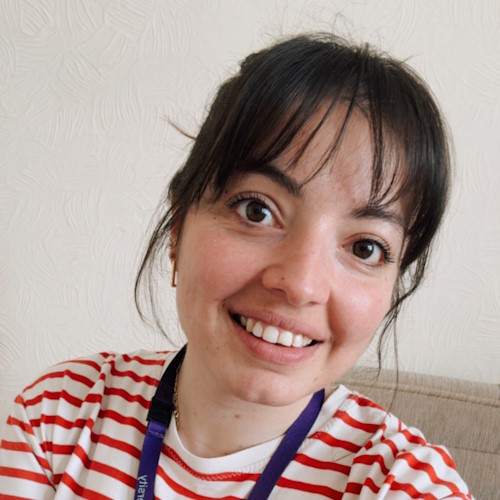
Nevin OzdenUniversity College London, UK 
Nevin OzdenUniversity College London, UK Nevin Ozden is a PhD student in the Developmental Diversity Group at the UCL Institute of Cognitive Neuroscience, with research funding from the Republic of Turkiye Ministry of National Education. Her research focuses on exploring the relationship between mentalising, retrospection (thinking about the past), and prospection (anticipating the future), with a particular focus on self-projection among autistic people. Her PhD research is supervised by Dr Sarah J White, Professor Sam Gilbert, and Dr+ Sveta Mayer. She completed her bachelor’s and master’s degrees in Turkiye. |
| 10:30-11:00 |
Break
|
| 11:00-11:30 |
Diversity of the individual and the social self in autism spectrum disorder (ASD)
Successful communication depends largely on the appropriate temporal organisation of intrapersonal and interpersonal signals in non-verbal communication. The psychopathological condition of ASD can serve as a diversity model for the intrapersonal and interpersonal synchrony of communicative signals. Our own studies on the intrapersonal synchrony of pointing behaviour and gaze behaviour showed a higher latency between the two signals and a higher variability in people with ASD. When comparing social pointing behaviour with simple motor tasks, we only found cross-domain associations between social and non-social traits in control subjects, but not in autistic individuals. This argues against a general synchronisation deficit in ASD and instead underlines the individual developmental heterogeneity in the acquisition of domain-specific behaviours. When transferring this measured nonverbal behaviour to virtual characters, the behaviour of the characters indicating ASD led to overall prolonged decoding times in the observers, and this effect was even more pronounced in observers with ASD. The results emphasise the importance of temporal differences in production and perception processes during multimodal nonverbal communication. These studies are complemented by findings that individuals with ASD are not able to recognise social intentions in gaze behaviour. Finally, dyadic communication shows that reciprocal gaze plays a much smaller role in encounters between individuals with ASD. In summary, results suggest that the coordination of communicative signals both intra- and interpersonally contribute to successful communication. To summarise, the current findings locate the manifestation of reduced reciprocity in autism not only in the person, but also in the interactional dynamics of dyads. 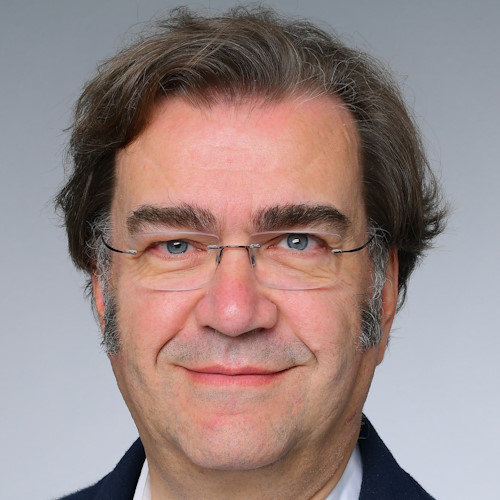
Professor Kai VogeleyUniversity of Cologne, Germany 
Professor Kai VogeleyUniversity of Cologne, Germany Kai Vogeley studied medicine and philosophy in Duesselford, Baltimore and London. After residencies in neuropathology, neurology and psychiatry, he passed board examinations in clinical neurology as well as psychiatry and psychotherapy. He is currently Professor for Psychiatry at the University Hospital Cologne and group leader for "social cognition" both at the Department of Psychiatry and the Institute for Neuroscience and Medicine - Cognitive Neuroscience (INM3) at the Research Centre Juelich. His research interests are social cognition and social neuroscience, experience of time, neurobiology of autism and schizophrenia, and philosophical aspects of psychopathology and neurosciences. |
| 11:30-11:40 |
Discussion
|
| 11:40-12:10 |
Panel: Experience of diversity of self

Professor Sarah GarfinkelUniversity College London, UK 
Professor Sarah GarfinkelUniversity College London, UK Sarah Garfinkel is a Professor of Cognitive Neuroscience and Group Leader of the Clinical and Affective Neuroscience Group at the Institute of Cognitive Neuroscience, University College London (UCL). She completed her PhD in Experimental Psychology at the University of Sussex, before undergoing a fellowship in Psychiatry and Neuroscience at the University of Michigan with further training in Autonomic Neuroscience at the Brighton and Sussex Medical School. Her current work at UCL focuses on brain-body interactions underlying emotion and cognition, with a particular focus on the heart. Adopting a translational perspective, she investigates the relationship between cardiac mechanisms and emotion in different clinical conditions. In September 2018, Sarah was named by the journal Nature as one of 11 "Rising Star" researchers, across all STEM disciplines internationally. In 2021 Sarah was awarded the mid-career prize by the British Cognitive Neuroscience Society. |
| 12:10-12:20 |
Psychedelic-induced changes in self-referential processing
Psychedelics such as psilocybin, a serotonin 2A receptor agonist, have shown to significantly alter self-perception, particularly during their acute effects. This makes them valuable tools for investigating the brain's self-processing mechanisms and their underlying neurobiology and neuropharmacology. Research combining psychedelic-induced altered states of consciousness with brain imaging techniques aims to measure self-referential processing – attempting to “decode the Self” into a quantifiable measure. To exemplify this area of investigation, we present an empirical study examining the effects of a single, moderate dose of psilocybin on behavioural and neuronal changes in self-referential processing in patients with major depression. Furthermore, clinical implications will be discussed. 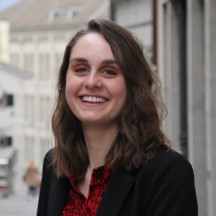
Lydia BelingerUniversity Hospital of Psychiatry Zurich, Switzerland 
Lydia BelingerUniversity Hospital of Psychiatry Zurich, Switzerland Lydia Belinger studied psychology at the University of Zurich in Switzerland. She is currently doing her PhD in the two research groups Addictive Disorders (PD Dr M Herdener) and Pharmaco-Neuroimaging and Cognitive-Emotional Processing (PD Dr K Preller) at the University Hospital of Psychiatry Zurich in Switzerland. As part of her doctoral studies, she is conducting the study Do psychedelics increase pro-social behavior? – A comparative pharmacological study in humans funded by the Tiny Blue Dot Foundation investigating the lasting effects of psychedelics on prosocial behaviour. More specifically, she is looking into whether the stimulation of the serotonin system by psilocybin and MDMA increases prosocial behaviour in healthy humans compared to a dopaminergic stimulation by methylphenidate. |
Chair

Professor Paul Verschure
Universidad Miguel Hernandez de Elche, Spain

Professor Paul Verschure
Universidad Miguel Hernandez de Elche, Spain
Dr Paul FMJ Verschure is the Unversidad Miguel de Elche Distinguished Professor affiliated with the CSIC Alicante Institute of Neuroscience and Department of Health Psychology. Paul has received his MA and PhD in Psychology and pursued his research at different leading international institutes, including the Neurosciences Institute and the Salk Institute, both in San Diego, the University of Amsterdam, University of Zurich, the Swiss Federal Institute of Technology-ETH, University Pompeu Fabra in Barcelona and Radboud Universiteit.
Paul has developed a unified theory of mind and brain, Distributed Adaptive Control (DAC), where he validates using empirical and synthetic methods. His research spans neuroscience, neurotechnology, cognitive science, robotics, artificial intelligence, and virtual/augmented-mixed reality. DAC has been applied to various technology that support and advance the human condition in the areas of Digital Brain Health, Education, and Cultural Heritage. Paul has coordinated and participated in many European projects, including as coordinator of the European University Alliance of Brain and Technology NeurotechEU.
Paul founded the SPECS research group in 1996, which comprised a multidisciplinary team of doctoral and post-doctoral researchers, including psychologists, engineers, and biologists who have widely published their results in leading journals and conferences. Paul co-chairs the annual Living Machines conference, the Alicante/Barcelona Cognition, Brain and Technology summer school, and he hosts the Convergent Science Network podcast with over 120 episodes. Paul has started several spin-off companies, Eodyne Systems and Sapiens5, and chairs the Future Memory Foundation and the Convergent Science Network. Paul is a dedicated endurance athlete and has completed 25 Ironman races.
| 13:20-13:50 |
The interpersonal self
The self is formed not only in individual context, but also during, and through, interactions with others. In this talk, I will focus on one of the aspects of the minimal self, namely sense of agency, in the context of social interactions. I will present empirical work conducted in my lab, where we studied sense joint agency in joint actions, individual sense of agency in a social context and vicarious sense of agency. Importantly, I will discuss social interactions not only with other humans, but also (and primarily) with humanoid robots. It is the latter case that provides important insights on conditions under which sense of agency is affected by social context. More specifically, our results show that attribution of intentionality to the robot partner is a key factor determining the emergence of sense of joint agency. On the other hand, physical embodiment and sensorimotor repertoire analogous to that of a human are crucial for vicarious sense of agency to occur. I will discuss the insights obtained through our empirical work in broader context of extended self. 
Professor Agnieszka WykowskaItalian Institute of Technology, Italy 
Professor Agnieszka WykowskaItalian Institute of Technology, Italy Professor Agnieszka Wykowska is the head of the unit "Social Cognition in Human-Robot Interaction" at the Italian Institute of Technology (IIT), in Genoa, Italy. She is also the Coordinator of the Centre for Human Technologies (IIT). She has a Master's Degree in Neuro-Cognitive Psychology (2006) and a PhD in Psychology (2008) from the Ludwig Maximillian University Munich. In 2016 she was awarded the ERC Starting grant "InStance: Intentional Stance for Social Attunement". She is Editor-in-Chief of International Journal of Social Robotics. Between 2022 and 2024 she served in the role of President of the European Society for Cognitive and Affective Neuroscience (ESCAN). In 2023 she was awarded the Hans-Fischer Senior Fellowship from the TUM Institute of Advanced Studies to lead a research group "Human Cognition in Neuroengineering". She combines cognitive neuroscience methods with human-robot interaction to understand the human brain mechanisms in interaction with other humans and technology. |
|---|---|
| 13:50-14:00 |
Discussion
|
| 14:00-14:30 |
The temporally-extended self: into the past and future
How do we know and experience ourselves as existing over time? How is it that, despite the many changes that we encounter over our lifetime, we have some sense of a persisting entity that remains with us as we age? Diachronic unity is fundamental to the temporally-extended self, enabling us to simultaneously hold both changes and continuity of the self over time – and to reconcile and integrate these two aspects of self. In this talk, I will discuss evidence for a candidate cognitive mechanism underpinning diachronic unity: autobiographical memory. Remembering our previous experiences or possessing knowledge of what has happened in our lives provide direct connections to our past selves and a confirmation of our existence over time. Similarly, prospection enables the extension of the self into the future and is also argued to be underpinned by autobiographical memory. I will discuss evidence from neuropsychology that the loss of autobiographical memory can erode the temporal self by degrading these connections to our past and future selves, as well as new neuroscientific research on the temporal self at timescales of seconds to years. Finally, I will consider the idea that non-mnemonic processes may provide an important basis for the temporal continuity of the self. 
Professor Donna Rose AddisUniversity of Toronto, Canada 
Professor Donna Rose AddisUniversity of Toronto, Canada Dr Donna Rose Addis is the Canada 150 Research Chair in Cognitive Neuroscience of Memory and Aging, Senior Scientist at the Rotman Research Institute, Baycrest, and Professor of Psychology at the University of Toronto. She worked at Harvard University and the University of Auckland before moving to Canada in 2018. Dr Addis is a cognitive neuroscientist who combines neuroimaging, behavioural and neuropsychological methods to investigate how the human brain remembers past experiences, imagines future events and constructs a coherent sense of self, as well as how these abilities differ with age, mood disorders, and memory loss. Her work has yielded new theoretical and philosophical perspectives, including the reconceptualization of memory as future-orientated. With over 130 publications and more than 26,000 citations, she has received a number of prestigious early career awards, and is the youngest-ever fellow of the Royal Society of New Zealand. |
| 14:30-14:40 |
Discussion
|
| 14:40-15:10 |
Break
|
| 15:10-15:40 |
The evolution of shared agency and social identity
Individuals in the modern world have complex social identities based on the groups and social categories with which they identify. Social psychology has shown that identifying with groups, even artificial minimal groups, generates behavioural effects in adults and children, such as ingroup favouritism, loyalty, and conformity. We propose that such effects originated evolutionarily from humans' unique skills and motivations to form shared agencies, with the evolutionarily original form of social identity being one's moral identity as a cooperative group member. For ancient humans, survival depend on being an assimilated member of a cultural group that was in turn competing against other groups. This context selected for self-reflective capacity to adopt a social identity (ie to view oneself as a member of a particular group) and concomitant self-regulatory motivations to maintain a positive social identity (ie to ensure that "I" the individual am being in line with what "we" the group expect, often via conformity). This evolutionary perspective helps account for a range of findings. Behavioural effects of group identity (eg ingroup favouritism, loyalty, conformity), moral emotions (eg guilt), and moral reasoning (eg deploying reasons and justifications to defend against threats to one's moral identity) are all expressions of social identity as a self-regulatory mechanism for maintaining one's good standing as a committed and trustworthy group member. 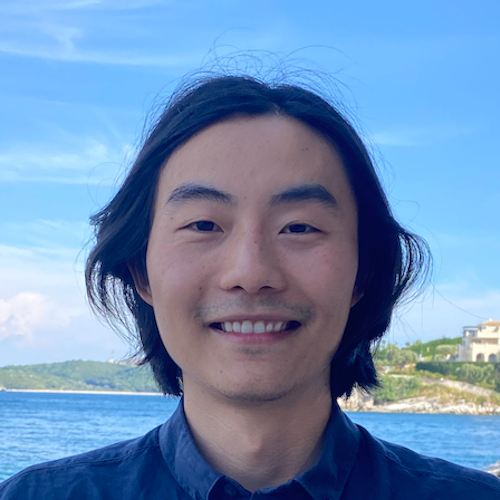
Dr Leon LiLeipzig University, Germany 
Dr Leon LiLeipzig University, Germany Dr Leon Li is a postdoctoral researcher at Leipzig University in Dr Sebastian Grueneisen's Cooperative Minds Lab. His postdoctoral research investigates the ontogeny of prosocially motivated rule-breaking and is funded by the Alexander von Humboldt Foundation. He obtained his PhD in 2022 at Duke University, advised by Dr Michael Tomasello, and his dissertation was titled The Development of Language and Morality as Forms of Social Action. Since his early days working as an undergraduate research assistant with Dr l Robert Slevc and Dr Melanie Killen at the University of Maryland, his research interests have broadly spanned the topics of language, morality, and social cognition. In addition to social identity, another topic he is currently investigating with Dr Gueneisen and Dr Tomasello is children's understanding of the objective reality (the other side of false belief). |
| 15:40-15:50 |
Discussion
|
| 15:50-16:20 |
Neuroscience of self-consciousness: embodied and extended
Humans experience a ‘real me’ that ‘resides’ in ‘my’ body and is experienced as the subject (or ‘I’) of conscious experience and thought. This aspect of self-consciousness, namely the feeling that conscious experiences are bound to the self and are experiences of a unitary entity (‘I’), is often considered to be one of the most astonishing features of the human mind. Professor Blanke will present recent work that targets self-consciousness by investigating a minimal form of self-consciousness that is based on the multisensory perception of tactile, proprioceptive, visual signals as well as interoceptive signals and has been studied in cognitive psychology, neuroscience, and in neurological patients (ie bodily self-consciousness, BSC). Highlighting a series of studies investigating two fundamental aspects of BSC, referred to as self-location and self-identification with an individual’s body, Professor Blanke shows that BSC is based on torso-centered signals in a distributed cortical network, centered in temporo-parietal cortex. Such a torso-centered BSC system, by coupling exteroceptive and interoceptive signals, is fundamental for self-consciousness, leading to conscious mental states that are experienced as if by a unitary and embodied subject. In a second part of his presentation, Professor Blanke will highlight recent work that explores links between BSC (self-location, the first-person perspective, sense of agency) and so-called extended or narrative self-consciousness (NSC), in particular spatial navigation and episodic autobiographical memory. He will present data showing that changes in BSC impact (1) spatial navigation performance and grid-cell like activity in entorhinal cortex and are of relevance (2) in episodic autobiographical memory, mediated by hippocampal activity coupled with BSC regions. These data link key subjective components of BSC with spatial navigation and the subjective reliving of personal events from one’s past. 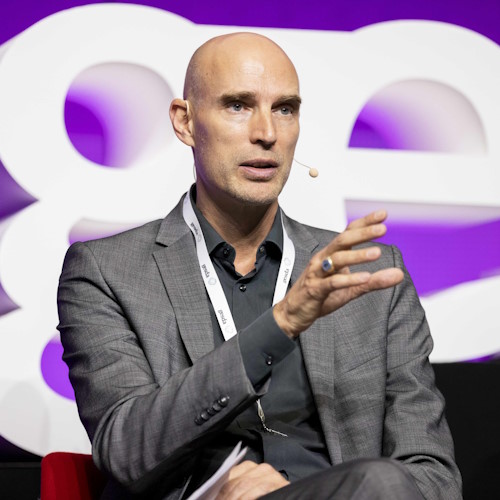
Professor Olaf BlankeSwiss Federal Institute of Technology, Switzerland 
Professor Olaf BlankeSwiss Federal Institute of Technology, Switzerland Olaf Blanke is Bertarelli Foundation Chair of Cognitive Neuroprosthetics at the Swiss Federal Institute of Technology (EPFL), where he directs the Laboratory of Cognitive Neuroscience at Geneva's Campus Biotech. He founded and directed EPFL’s Center for Neuroprosthetics (now EPFL’s Neuro-X Institute) and is Adjunct Professor in the Department of Neurosurgery at Geneva University Hospital. Blanke’s research focuses on the neuroscience of consciousness and embodiment, hallucinations and human augmentation as well as neurodegenerative diseases such as Parkinson’s disease. Blanke pioneered robotics and virtual reality technology in neuroscience of consciousness, cognitive science, and recently meditation practice. Blanke has made several seminal contributions towards a neuroscientific theory of self-consciousness and showed how self-consciousness depends on cortical processing of specific multisensory bodily signals. This research established a data-driven model of self-consciousness and introduced the concept of bodily self-consciousness - a perceptual account of self-consciousness - that is based the processing of multisensory bodily signals (exteroceptive and interoceptive signals). He has over 250 peer-reviewed scientific publications in high-impact journals, including Nature and Science and his work has been cited over 30'000 times. His medical-translational activities are dedicated to preventive, diagnostic and therapeutic procedures and devices in Parkinson’s disease and dementias, sustaining mental health and preventing cognitive decline. Blanke is co-founder of the wellbeing technology company Metaphysiks Engineering and member of the board and chief scientific advisor of the digital neurotherapeutics company Mindmaze. |
| 16:20-16:30 |
Discussion
|
| 16:30-17:00 |
Panel: future directions

Professor Tony PrescottUniversity of Sheffield, UK 
Professor Tony PrescottUniversity of Sheffield, UK Tony Prescott is Professor of Cognitive Robotics at the University of Sheffield in the UK. His background mixes psychology, neuropathology and brain theory with robotics and AI, and his research aims at answering questions about natural intelligence by creating synthetic entities with capacities such as perception, memory, emotion and sense of self. He has worked extensively on brain-inspired cognitive architectures for both mammal-like and humanoid robots, and with his own collaborators has created several novel animal-like robot platforms. Tony has co-authored over 250 journal articles and conference papers and the edited volumes Scholarpedia of Touch and the Handbook of Living Machines. His popular science book The Psychology of Artificial Intelligence, published in 2024, explores the similarities and differences between human and artificial intelligence. |

.png)
